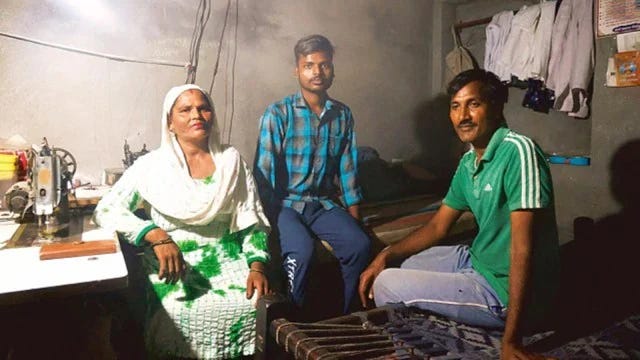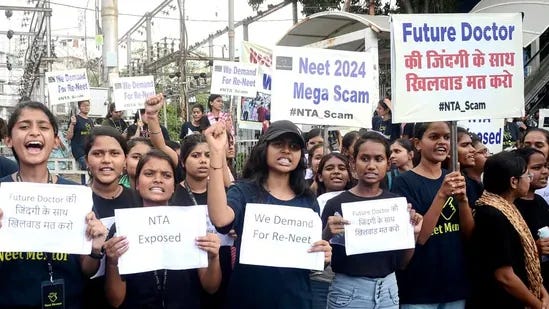When Basic Education Requires Legal Battles - And What Needs To Be Done About It
We find ourselves in a paradox where individual success is celebrated as an alibi to ignore systemic failures
Published in The Hindustan Times
Recently, a quintessentially Indian story hit the news: Atul Kumar, a Dalit student, fought all the way to the Supreme Court after losing his hard-won seat at IIT Dhanbad. He had cleared the prestigious exam but narrowly missed the deadline to deposit the Rs 17,500 fee—a sum his poor Dalit parents couldn’t gather in time. This article cannot recount the full details of this extraordinary story but it is a testament to the deep commitment of Atul’s parents - Rajendra and Rajesh (the mother) - that they didn’t give up and fought for their child’s future all the way to the Supreme Court, which then used its extraordinary power to direct IIT Dhanbad to grant admission to Atul Kumar.
But why is this story quintessentially Indian? Because it embodies the deep aspiration of our youth, the relentless sacrifices required by entire families to secure basic opportunities for a single member of their family, the struggle to scrape together a seemingly "small" amount, and the institutional and political apathy that forced the family to seek relief from the highest courts—relief however for just one student. Atul's parents are the heroes of this story, but it also highlights a deeper tragedy: as a nation, we continue to fail vast numbers of our youth by not providing the bare minimum they need to to move forward - affordable, accessible education.
The relief granted to Atul is heartening but raises a critical question: why must a basic constitutional right like education require intervention from the Supreme Court? This case starkly illustrates how the state has abdicated its duty to provide the infrastructure and support needed for marginalized individuals to access this basic right, failing those who need it most.
Atul Kumar's case also speaks to the persistence of caste-based inequalities embedded in our economic system. His fight wasn't just about financial hardship; it was a struggle against entrenched discrimination that keeps Dalits disproportionately poor.
Consequently, we find ourselves in a paradox where individual success is celebrated as an alibi to ignore systemic failures. The obvious question then is what kind of democracy are we building if access to the most fundamental tool for socioeconomic mobility - education - itself remains entangled with caste and economic hierarchies?
This incident also mirrors the contradictions within Indian democracy. On one hand, "social justice" is experiencing a renaissance in political discourse. On the other hand, the necessary institutional and political focus to bring tangible change to marginalized communities remains absent. For every Atul Kumar who succeeds, lakhs fall through the cracks— unable to crack some exam due to systemic disadvantages, unable to muster small amounts like Rs 17,500 even for life-changing opportunities, and unable to navigate an inherently exclusionary system.
While Atul's court victory must be celebrated, the real question is: how do we dismantle the structures that make such stories so common? Social justice must move beyond political rhetoric to concrete action. Here are two immediate steps that must be taken:
First, across fields—be it medicine, quality engineering, or other opportunities—aspirants far outnumber available seats. Multi-layered structures of inequality ensure that those on the margins remain consistently excluded instead of being prioritized so that they may break the cycle of exclusion and marginalization. One obvious aspect of this exclusion is the untenable privatization of higher education in our country. As per the latest available data from All India Survey on Higher Education (AISHE) by the Ministry of Education, almost 80% of all colleges are private.
This is untenable in a country where 90% of the population lives on less than 2 lakhs per annum. While high-tech industries like semiconductors and AI are strategic imperatives, empowering our youth is equally - if not more - crucial. The government must put the entire might and resources of the Indian state behind both, not just the former.
Second, education is too fundamental for its access to be denied due to a public private distinction. Instead of rhetorically talking about increasing educational opportunities at some undetermined future date, our youth deserve access to education in the here and now. If this requires more robust reservation policies, so be it. Almost two decades ago, the UPA Government passed the 93rd Constitutional amendment, empowering the state to advance SC/STs and other socially and educationally backward classes through reservations including in aided and unaided private education institutions. However, there has been no movement on enabling legislation. The Parliament is now more evenly balanced. It is time for the Opposition parties to take this up and put institutional might behind political rhetoric. In any case, the political mandate is already in place and while a larger national consensus is created, various state governments can move forward and set an example for the country.
Atul Kumar’s struggle ended with a heartening victory, but it's not enough. It highlights a deep, structural failure—a reminder that for every success, lakhs are left behind. As a nation, we cannot afford to celebrate individual triumphs while neglecting the system that perpetuates such struggles in the first place. True progress will come only when we ensure that no student’s right to education is dependent on their ability to fight all the way to the Supreme Court. The time for political rhetoric has passed. It's time for the state - and political parties - to step up and deliver.
K Raju is Permanent Invitee to the CWC. Ruchi Gupta is former national incharge of the NSUI and Executive Director of the Future of India Foundation
Also Read:






Excellent piece Ruchi. The call-out on structural and systemic barriers that prevent our youth from accessing opportunities for thriving is important.
So true!